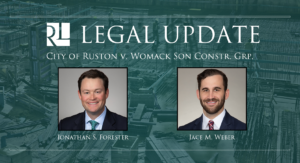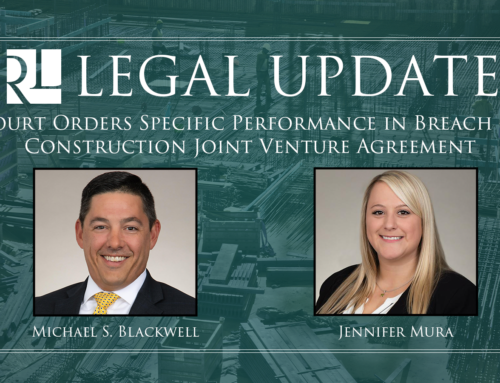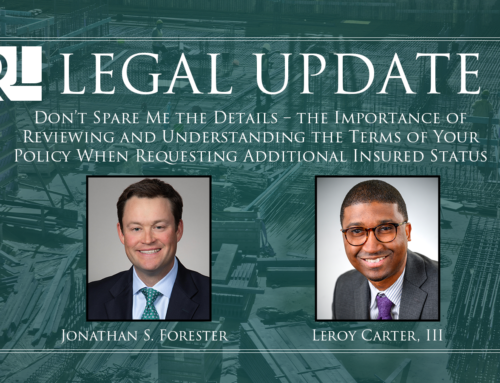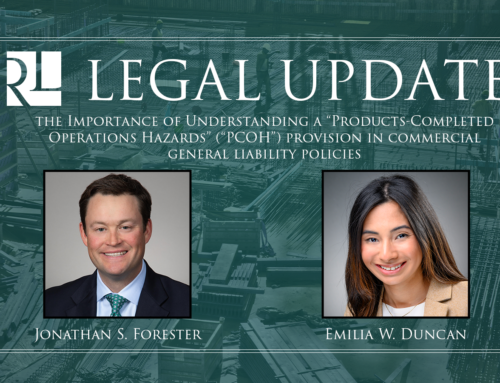 City of Ruston v. Womack Son Constr. Grp., 55,328 (La. App. 2 Cir. 11/15/23), 2023 WL 7570765:
City of Ruston v. Womack Son Constr. Grp., 55,328 (La. App. 2 Cir. 11/15/23), 2023 WL 7570765:
Breadth of Change Order Release Waives Owner’s Later Claims against General Contractor
Authors: Jonathan S. Forester and Jace M. Weber
City of Ruston is the most recent example of why it remains important to read and consider the breadth of language in not only contracts, but also in change orders. The City of Ruston (the “City”) contracted to host the July 2019 Dixie World Series (a nationally recognized youth baseball tournament). To accommodate hosting the World Series, in 2017 the City awarded a $35 million public works contract for the construction of a large-scale sports complex (the “Project”), to Womack & Sons Construction Group, Inc. (“Womack”). During construction, issues arose concerning water leaks to the synthetic turf playing surfaces on five of the baseball fields.
Womack subcontracted with GeoSurfaces (“Geo”) to install the turf playing surfaces. In late fall 2018, Womack and Geo noticed water leakage from the turf’s subsurface base. In an email from Womack to Geo, Womack stated ‘I do not want any inspectors noticing and causing a problem.’ However, Womack did not inform the architect for the Project, Yeager, Watson & Associates, LLC (the “Architect”), of this issue until January 2019. A dispute ensued regarding whether these leaks were due to Womack and Geo’s subpar workmanship or inclement weather conditions.
In late January 2019, the City was finally informed of the turf issues and was presented with options to remedy these issues. The Architect proposed proceeding with the original turf installation design which would have delayed project completion, jeopardizing the City’s opportunity to host the July 2019 Dixie World Series. Womack proposed modifying the turf installation design to meet the project deadline but requested additional compensation (approximately $1.8 million) to implement this change. Before any change order was executed regarding the turf issues, the Architect issued a memo to all parties whereby the Architect recommended the City not to pay Womack additional compensation to carry out the new turf design as the Architect believed Womack’s delay and poor workmanship were the causes of the turf installation issues.
Despite the Architect’s recommendation, in February 2019, all parties signed Change Order No. 2, reflecting Womack’s proposal and redesign of the turf installation with an additional cost of approximately $1.8 million. Thereafter, Womack completed the Project on time and the City paid Womack the remaining contract balance in addition to the full amount of Change Order No. 2.
However, in 2021, the City filed suit against Womack for breach of contract to recover the amount the City paid to Womack pursuant Change Order No. 2 (approximately $1.8 million), alleging that Womack’s delay and poor workmanship were the causes of turf installation issues. In response, Womack filed a motion for summary judgment arguing that the following clause in the contract constituted a final settlement of all claims regarding the change order in question.
Agreement on any change order shall constitute a final settlement of all matters relating to the change in the Work which is the subject of the Change Order, including, but not limited to all direct and indirect costs associated with such change and any and all adjustments to the Contract Sum and the Contract Time.
The trial court ruled in favor of Womack, granting its motion for summary judgment. The City then appealed, raising numerous assignments of errors/arguments including: 1) that summary judgment should be precluded since material factual disputes existed regarding the parties’ intent in executing Change Order No. 2 (the cause of the damage to the turf’s subsurface base and which party would pay for the new design); 2) that the trial court misinterpreted a single sentence of the contract and failed to consider other relevant clauses in the contract; 3) holding the City responsible for a $1.8 million problem allegedly caused by Womack would produce an absurd result; and 4) that the parties’ agreement to the change order in question was negated by error, fraud, and financial duress (vices of consent).
The First Circuit rejected the City’s first three arguments above, relying predominantly on La. C.C. art. 2046, which provides that when the words of a contract are clear, explicit, and lead to no absurd consequences no further interpretation is necessary to search for the parties’ intent. The Court found that the contract’s terms were unambiguous. Accordingly, the Court held that further consideration of the parties’ intent in executing Change Order No. 2 was unnecessary; and pursuant to the clause above, the City waived its right to pursue other provisions in the contract by agreeing to and executing Change Order No. 2. The Court reasoned that “Unexpressed intentions or desires, not included in the written agreement of the parties, do not create ambiguity.” Further, the Court held that making the City responsible for Womack’s alleged poor workmanship would not lead to an absurd consequence because one side making a bad deal does not constitute an “absurd consequence that would justify rescinding the entire contract.” Therefore, the court rejected the City’s first three arguments above.
The Court then went on to address whether error, fraud, and financial duress invalidated the parties’ agreement to Change Order No. 2. The Court found no evidence of error. Concerning fraud, the Court reasoned that while Womack delayed and withheld disclosing the turf issues, the City had knowledge of these issues before it executed Change Order No. 2. Specifically, the Court stated, “Even if the omission by Womack rose to the level of fraud, the City could have ascertained the truth without difficulty, inconvenience, or special skill.” Additionally, the Court found that the circumstances did not constitute financial duress. The Court reasoned that the City and Womack were sophisticated parties who negotiated the change order prior to signing the document and that the City had “the same, if not greater, bargaining strength than Womack.” Therefore, the Court rejected the City’s argument that certain vices of consent vitiated the parties’ agreement to Change Order No. 2.
Judge Robinson dissented reasoning that genuine issues of material fact existed which precluded summary judgment. Judge Robinson reasoned that Womack’s late disclosure of the turf defects left the City with no choice but to execute the change order to meet the World Series deadline, constituting financial duress.
In summary, the First Circuit’s opinion illustrates another example of the court’s upholding of an agreement when the agreed-upon terms are clear, explicit, and lead to no absurd consequences. It also illustrates the challenges in prevailing on an error, fraud, or duress claim to unravel an agreement that the challenging party previously executed. For the construction industry, this ruling may offer a persuasive precedent that when a clause in a construction contract provides that agreement of a change order constitutes a final settlement of all claims between the parties, once a change order is executed by all parties, it may constitute a final settlement of all related matters, including any claims or disputes arising from the change. To avoid a similar result, parties should carefully review the language in the agreements they sign. Additionally, and depending upon which position you are in, it is imperative to tailor language to either limit any release to claims at issue as the City should have or expand it to broadly cover any issues that arise in the future as Womack did.



